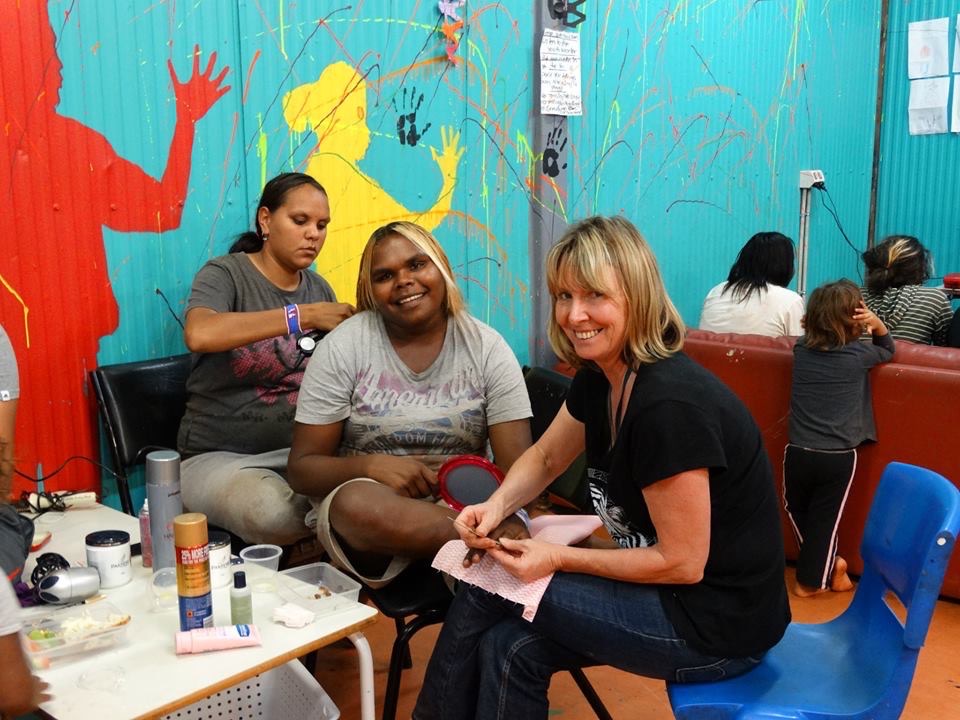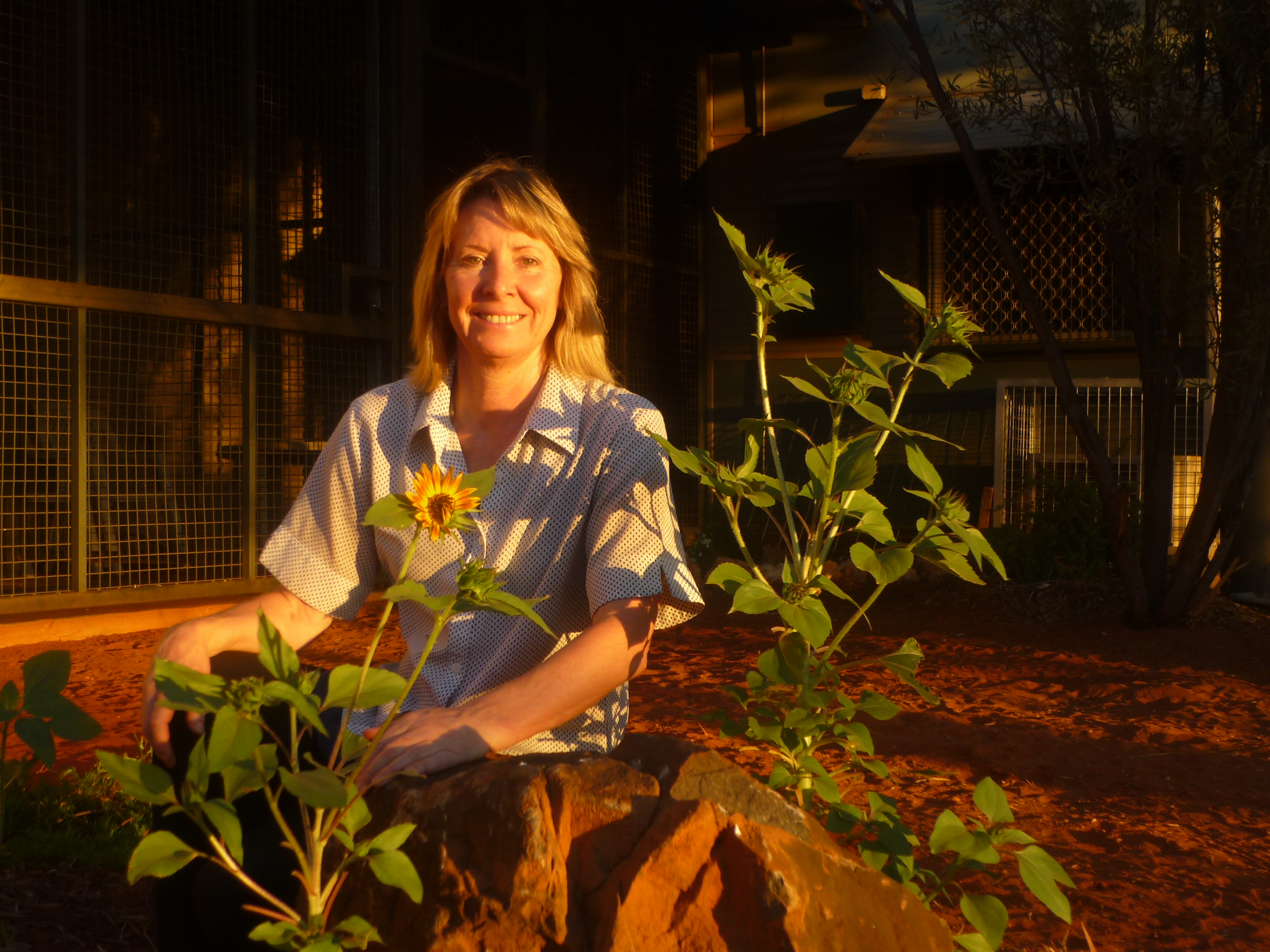January 2020
Article from January edition of INPractice
Keith Woodford’s first memory of his late wife is set in a suburban Adelaide shopping centre.
“She worked at the pharmacy, I worked at the butcher shop, and I saw her walk past a couple of times,” Keith says. “It was actually Gayle who approached me and the first thing she did was smile—it lit up the room.”
The meeting marked the start of a lifelong partnership for the couple, who would go on to have two children and ultimately end up settling in the APY Lands so Gayle could work as a nurse in the remote community of Fregon.
Nursing, says Gayle’s younger sister Andrea, “runs deep in the family.”
“Our mother was a nurse and she was the inspiration for Gayle to move into the profession,” Andrea says. “Gayle’s daughter Ali, niece Erin and sister-in-law Amy, are also nurses, so the generational tradition continues.”
“Gayle had so many skills and so much to offer—she loved helping people,” she says.
She worked as a Registered Nurse in a variety of health settings, but it was a posting at a far regional hospital that really struck a chord with Gayle.
“Leigh Creek Hospital was where she first experienced providing care in the outback and she very quickly realised the difference she could make to the health and wellbeing of people living in remote areas.”
MAKING A DIFFERENCE IN REMOTE COMMUNITIES
In 2011, she took a position as a remote area nurse with the Nganampa Health Council, an Aboriginal Community Controlled Health Organisation operating on the Anangu Pitjantjatjara Yankunytjatjara (APY) Lands.
The role saw the pair settle in the small Fregon community, just 200kms south of the Northern Territory border with South Australia.
“As soon as we arrived, Gayle was doing cultural training and learning the local language so that she could provide the best possible care to the people living in the area,” Keith recalls.
“She quickly gained the respect of the local women, who confided in her and looked to her for guidance,” he says. “She made great relationships with them, which is very difficult to achieve.”
The admiration Gayle had earned was demonstrated in the unlikeliest of places, recounts her daughter Ali.
“I was in Rundle Mall with Mum one day and we heard ‘my nurse, my nurse!’,” Ali says. “We turned around and saw a group of Fregon locals waving at us. They were so happy to see Mum, ‘their nurse,’” Ali says.
“I could see how much the Anangu people respected and appreciated her and I totally understood. Her intelligence, passion and devotion to people will always remain one of my fondest memories of Mum.”
Gayle was also a much-admired older sister to Wendy, Andrea and Darren.
“There was nothing she couldn’t do, she was so talented and creative. She always had the right answer at the right time,” Andrea says. “She was full of adventure, always smiling and always making us laugh.”
Tragically, this was all taken away on 23 March 2016—almost five years to the date Gayle and Keith moved to the APY Lands.
Gayle had returned home to finish her on-call shift from the comfort of her bedroom after her last consultation at the nearby clinic. It was around 9.30pm.
“It was just like any other normal Wednesday. Gayle was beside me reading in bed,” says Keith. It was the last time Keith saw his wife.
He woke the next morning to find Gayle missing and her clinic ambulance no longer parked outside their high-security home.
After a two-day search, Gayle’s body was recovered in nearby scrubland and life for the Woodford family would never be the same.
Their much-loved wife, mother and sister had been brutally murdered after being lured out of the house by a convicted sex offender claiming that his grandmother needed medical assistance.
 Gayle quickly earned the respect of women in the remote APY Lands community, where she was passionate about making a difference to the health and wellbeing of residents.
Gayle quickly earned the respect of women in the remote APY Lands community, where she was passionate about making a difference to the health and wellbeing of residents.
#NEVER ALONE
The circumstances surrounding Gayle’s death sparked what would become a four-year crusade by the family for laws to ban single-nurse postings in remote areas—a cause also being championed by the Australian Nursing and Midwifery Federation (SA Branch).
“It is crucial to secure more federal funding to employ enough nurses to work in pairs to offer emotional support to each other in remote areas but also to improve the treatment to the community,” ANMF (SA Branch) CEO/Secretary Adjunct Associate Professor Elizabeth Dabars AM said in a statement at the time of Gayle’s death. “This dual effect will improve the system and the safety of all nurses in these communities.”
Keith made his intentions clear some 14 months after his wife’s death, breaking his silence minutes on the day after her killer was sentenced to a non-parole term of 32 years.
“I want every nurse to feel like when they go to work, they can go to work without fear of being raped, murdered, beaten,” Keith said to media outside the courthouse.
“I will do whatever is necessary to apply public pressure on governments and health authorities to implement Gayle’s Law.”
Even though ‘whatever is necessary’ proved a long and ferocious battle for the family, the Woodford family never once thought of giving up.
“We were not going to stop until there was a law in place that ensured no nurse should ever go out alone again,” Keith says. “We knew that is what Gayle would have wanted too.”
The first curveball came in November 2016, when SafeWork SA declared Gayle’s death was not work-related—a decision that left the family feeling “angry” and “insulted”. Questions raised by ABC’s Australian Story program triggered SafeWork SA to review the decision and, almost 18 months later, reclassify her death as work-related.
It would not be the first time delays hampered the cause.
While months of campaigning and media and political advocacy by Gayle’s family and the ANMF (SA Branch) saw Gayle’s Law passed through State Parliament in December 2017, it would be almost another two years before the law became fully operational.
CLOSING THE LOOPHOLE THAT LEFT NURSES AND MIDWIVES EXPOSED
Regulations underpinning the legislation were not drafted until 15 months after the law was passed. And despite feedback and vehement opposition by the ANMF (SA Branch) and the Woodford family, the State Government proceeded with regulations from 1 July that served only to undermine the intent of Gayle’s Law.
“Gayle’s Law makes it abundantly clear: no health care professional working in remote areas should be forced to attend after-hours emergency callouts alone,” Ms Dabars said at the time in June 2019. “Yet the regulations issued by the State Government provide a loophole that allows nurses to attend after-hours emergency callouts alone if they consider it safe.”
“There will be circumstances that appear safe or where time does not permit an appropriate and proper risk assessment to be undertaken. These are some of the same factors that contributed to Gayle’s untimely death,” she continued.
Intent on ensuring its remote area members were not left exposed by the gap, the ANMF (SA Branch) continued to lobby for regulations that kept health service managers accountable for the safety of their staff, rather than placing the onus on the health care practitioner.
The combined strength of 21,000 nurses, midwives and personal care workers and one very determined family resulted in the regulations being disallowed by Parliament in September 2019 and new regulations—removing the loophole—implemented in November 2019.
“We are forever grateful to the ANMF for finding the flaw in the regulations, because Gayle’s Law is now the best version it can be,” Keith says. “We couldn’t have achieved what we have without the support of the ANMF.”
“No one deserves to go through what our family has endured. We were determined to ensure all remote area nurses could go to work safely and feel secure in their workplace,” he says.
“We now have a new level of safety here in South Australia. We are very proud. Gayle would be so proud.”
The challenge ahead is for each state and territory to adopt similar safety measures within their jurisdictions.
TAKING GAYLE'S LAW ACROSS AUSTRALIA #GONATIONAL
“Our next move is to push for Gayle’s Law to go national, because we won’t stop until every nurse in Australia is protected from having to attend after-hours call-outs alone,” Keith says.
Ms Dabars agrees, reaffirming the ANMF’s long-held commitment to supporting the campaign for Gayle’s Law to apply Australia-wide.
“Whilst it is very positive that we now have these strengthened safety laws in South Australia, nurses and midwives across the country need and deserve the same type of solution at a Federal level,” she says.
But right now, for the Woodford family, there is a closer hurdle around the corner.
“The coronial inquiry into Gayle’s death is being held this month,” Keith says. “It’s going to be really tough, but we know it is a necessary step for our family to find some closure.”
Gayle’s smile remains forever captured in the photographs her friends and family will continue to cherish, but her legacy now lives on in the increased level of protection being afforded to her remote nursing and midwifery colleagues in South Australia...and beyond, if the Woodford family has anything to say about it.
 Gayle’s smile lives on in new laws that make it safer for remote area health care practitioners by preventing them from having to attend after-hours call-outs alone.
Gayle’s smile lives on in new laws that make it safer for remote area health care practitioners by preventing them from having to attend after-hours call-outs alone.
All photos provided by the Woodford family.
Click here to read the January 2020 edition of INPractice.